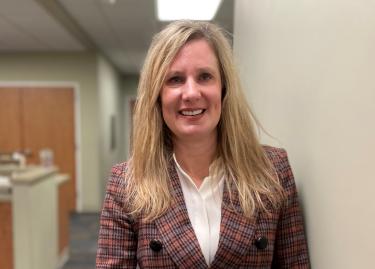





News and Events
The Core of What We Do: Nurse practitioner Lacy Vogtman loves caring for patients at team-oriented Papillion clinic
Published: Feb. 22, 2024
In “The Core of What We Do,” you’ll learn more about Methodist’s core service lines – primary care, oncology, cardiology, women’s health and orthopedics/surgical services – and the people whose dedication makes them so impactful for our communities.
Lacy Vogtman, MSN, APRN
Family Medicine Nurse Practitioner
Methodist Physicians Clinic in Papillion

Why is this service line so important?
The family medicine service line is generally the initial point of access for patients seeking health care in the Methodist system. Urgent care can also be an initial access point of access for patients not already part of our system, and many will later establish care with a Methodist provider.
Tell us about your role at Methodist.
I’m a family medicine nurse practitioner. I’ve worked for 13 years in family medicine at Methodist Physicians Clinic in Papillion, and I’ve had the joy of getting to know the majority of my patients and families over many years.
Prior to my time in Papillion, I worked 15 years for Methodist or was associated with the system in a variety of capacities.
Family medicine care includes preventive and wellness services; assessing, diagnosing, treating and managing acute and chronic illnesses; collaborating with and referring to specialists; coordinating care; and counseling and educating patients.
We focus on the overall health and well-being of patients of all ages and their families. A typical day at my clinic is varied. I might perform any of the services listed above, but no two days are alike.
What do you enjoy most about your team?
At our clinic, we have two very strong physician leaders, Paul Mueller, MD, and Gregory Precht, MD, as well as a very experienced physician assistant, Chelsea Richardson, PA-C.
I’m blessed to have the physician and colleague support that I do. It truly improves my job satisfaction, allowing me to do my job to the best of my ability. I feel we have great communication and collaboration, and we share the same optics regarding the best way to deliver health care.
I also immensely enjoy the staff at the clinic. We have significant longevity at our site — many staff members with 10-plus years of experience — and I believe this is a testament to our clinic’s positive culture.
Our clinic manager, Brandy Mink, has a tenure of more than 20 years and has been instrumental in staff retention as well as provider and staff support. She’s had many roles at our clinic over the years, and I credit her to maintaining the positive culture we all love.
Our clinic has a bit of a small-town feel. Many of the patients have been coming here for decades and know everyone who works here. The bonus is that we’re part of a larger health system with access to a variety of specialties, advanced diagnostics and options when a patient needs a higher level of care.
What’s the best thing about your role?
The best thing about my role here is the opportunity I have to help patients navigate their health concerns and talk through options. I also enjoy learning, and I believe the basis of being a good provider is to continue learning, growing and seeking new information.
What does The Meaning of Care mean to you?
The Meaning of Care is the fundamental value of our health care system. We work with human beings, addressing their biopsychosocial needs on all levels, and in order to understand how to do that, we must possess an ability to care for them and connect.
Are there any memorable moments from your work that stick out?
My strongest memories are a constellation of so many things – for example, patients improving their health after coaching on diabetes management, patients getting good news back on test results or the power of early screenings translating into improved cancer treatment options.
Emergency situations can happen, too. I recall being a brand new provider in the clinic when a mom and her child burst through the front door. The child was experiencing anaphylaxis after receiving a vaccination at another health system in the area. Dr. Mueller promptly administered epinephrine, and the child had a great health outcome due to this calm, quick intervention.
Emergencies aren’t a daily part of our job, but they do occur, and we must stay on our toes and be ready to act.
What do you enjoy outside of your time at Methodist?
I love spending time outdoors, spending time with my family, reading and traveling.
